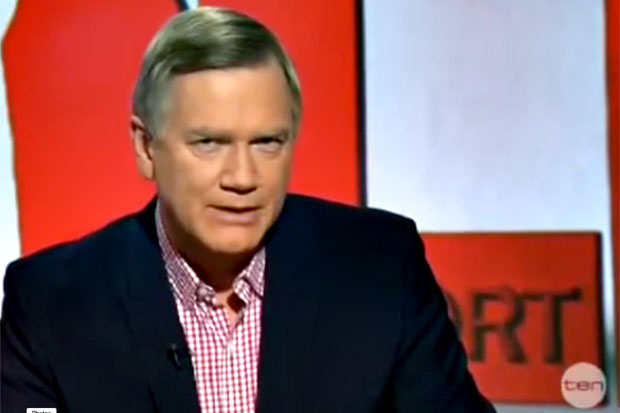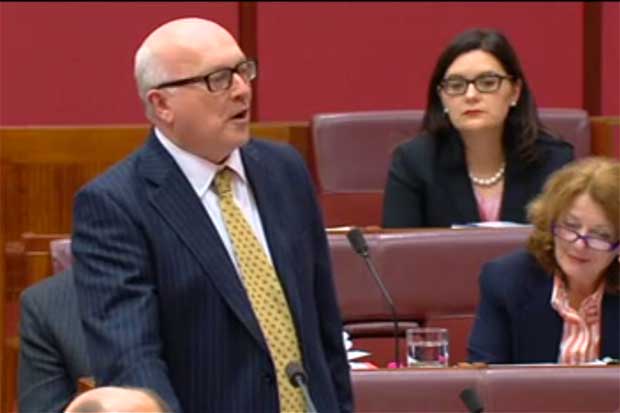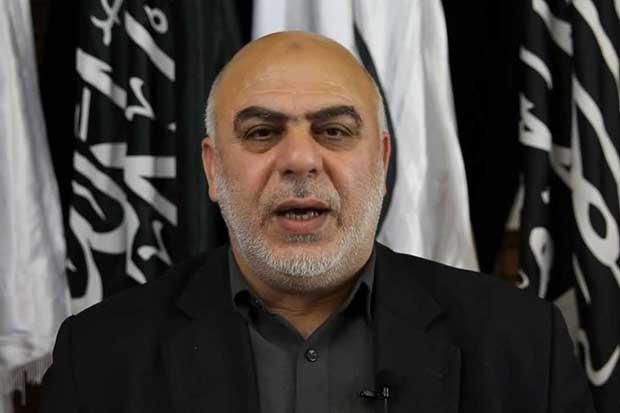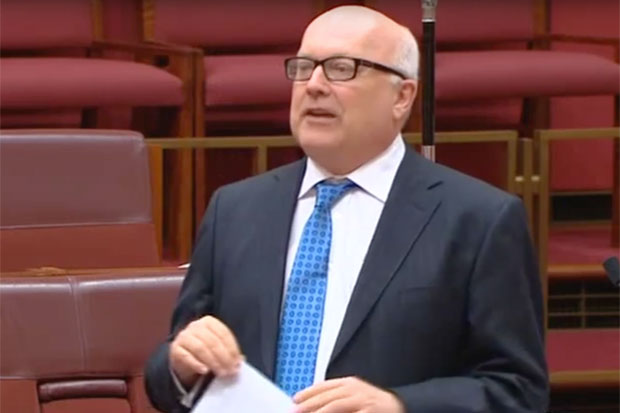So it turns out, Attorney-General George Brandis’ most treasured beliefs aren’t so treasured after all. Having expended considerable public energy and advocacy in advocating the effective abolition of laws that would restrict the expression of racist speech, Senator Brandis has now decided that it is of pressing importance to restrict racist speech.
All of his smug words about freedom and liberty are once again quietly forgotten. As I’ve said before, when a right-winger in Australia invokes their concern for freedom of speech, check your pockets. It is probably a scam.
Let’s go back to 2014. Senator Brandis famously said that ''People do have a right to be bigots, you know”.
Whilst this caused a lot of controversy, as international human rights law academic specialist Professor Sarah Joseph observed, “Though I suspect he regrets the statement, Brandis is actually correct from a human rights point of view… people have an absolute unqualified right to be bigots! Article 19(1) of the International Covenant on Civil and Political Rights (“ICCPR”) guarantees the right to freedom of opinion. People can hold any opinion, no matter how horrid or bigoted.”
Brandis made it reasonably clear that his desire to change the law stemmed from the successful prosecution of right-wing columnist Andrew Bolt for breaching the Racial Discrimination Act. Specifically, section 18C, which concerned speech which humiliated, offended, insulted or intimidated people on the basis of race, colour, national or ethnic origin.
Brandis expressed his horror at Bolt’s supposedly uniquely traumatic ordeal: “Never again in Australia will we have a situation in which a person may be taken to court for expressing a political opinion”.

He explained that, “People have the right to say things that other people would find insulting, offensive or bigoted.”
Brandis beat the drum on his new cause everywhere he could. He explained to Fran Kelly that it wasn’t okay to subject someone to “civil penalties and legal prohibitions for expressing opinions, merely because somebody else in the community might have been offended or insulted by them”.
Perhaps the biggest obstacle for Brandis was the involvement of the Jewish lobbies in opposing the amendment of the RDA. So Brandis tempered his opposition to people going to court for expressing political opinions – it would need to be balanced against stronger laws against inciting hatred for someone on the basis of their ethnic origin or racial background.
In defending his laws, Brandis singled out one community and one community alone with “sensitivities” which he would take into account: the Jewish community.
Brandis was, “of course, deeply conscious of the sensitivities of this issue, particularly for Jewish people”.
He earnestly explained that he had consulted with “leading members of the Jewish community”. To show further that he was exempting the Jewish community from his RDA exemptions, Brandis even claimed that under his proposed amendments, “Holocaust denial would be caught by the proposed language of the new law.”
This last claim was rather dubious. In March 2014, he released his draft amendments. Putting aside the limited nature of the other provisions, the final subsection provided that, “This section does not apply to words, sounds, images or writing spoken, broadcast, published or otherwise communicated in the course of participating in the public discussion of any political, social, cultural, religious, artistic, academic or scientific matter.”
So when discussing any political or social matter, vilifying and intimidating people on the basis of race would have been permitted. Including Holocaust denial.
In April 2014, a Nielsen poll revealed that the Coalition and Murdoch press campaign to change the RDA had been spectacularly unsuccessful. Despite the alleged persecution of Bolt, 88 per cent of Australians wanted to keep the provisions making it unlawful to offend, humiliate, insult or intimidate on the basis of race.
In the face of public repudiation, Brandis beat his retreat. The proposed changes were shelved, and are unlikely to again see the light of day.
For his part, Brandis continued on in his cynical way. He pushed through legislation criminalising journalism on ASIO operations, and some forms of whistleblowing. According to social justice lawyer Lizzie O’Shea, under this legislation, a person could be sent to prison for life for leaking government materials showing serious wrongdoing.
Brandis was also previously part of the Howard government which introduced Australia’s uniform national defamation laws.
Though they are scandalously repressive, he has shown no interest in amending them, presumably because they mostly function to protect the rich and powerful.
By the time of the Charlie Hebdo massacre in January this year, Brandis was once again proclaiming that “freedom of expression… is the lifeblood of free societies”.
And then came Brandis’s new position on racist speech on September 4, announced in a paper well known for its racial sensitivity: the Daily Telegraph.
It included the by now standard Brandis boilerplate on freedom of speech: “integral to the strength of any great democracy”, “Free speech has no greater advocate than I”, and “it would be meaningless if it did not extend to the ideas we might find disagreeable or even offensive.”

But just as Brandis once recognised the sensitivity of Jews, and Jews only, to racist speech, now Brandis has recognised the exception of Muslims, and Muslims only to freedom of speech.
Brandis mooted a new law: “The government has also decided to introduce a new crime of advocacy of genocide. This will be part of the next tranche of counter-terrorism legislation to be introduced later this year.”
Precisely what this means is not yet clear. If it is narrowly framed, it will be consistent with international law, and a welcome development. The Genocide Convention provides that “direct and public incitement to commit genocide” should be punishable.
But “direct and public incitement” to genocide is not the same as advocacy. Banning advocacy of genocide is politically safe, and will probably find few opponents in Australia. Australia has no tradition of freedom of speech, so drawing a distinction between advocacy and incitement will probably seem strange, if not unduly legalistic to readers.
In the US, the distinction might be better understood. In Brandenburg, the American Supreme Court declared it an unconstitutional infringement on freedom of speech to ban “the duty, necessity, or propriety of crime, sabotage, violence, or unlawful methods of terrorism as a means of accomplishing industrial or political reform”.
Inciting imminent violence was unlawful, but mere advocacy was to be fair game. The case established the right of the Ku Klux Klan to hold their viciously racist rallies, and has applied to speech across the political spectrum.
For those seeing the movie about NWA, it is worth recalling that when rappers like NWA and Ice-T made songs about killing police, this was a matter of advocacy, not incitement, and was consequently constitutionally protected free speech.
Brandis has previously claimed that he would hate to see someone going to court over their political views. Banning genocide advocacy may seem clear-cut, but the issue of what constitutes genocide is widely contested.
For example, more Aboriginal children are currently being removed from their families at greater rates than occurred during the officially recognised Stolen Generations era. Given that some recognised the removal of Aboriginal children from their families as being genocidal in the past, it is at least arguable that such removals are genocidal today too.
Can we expect to see media figures and politicians who support the continued removal of Aboriginal kids from their families being tried for genocide advocacy?
Or what about those who support the siege on Gaza, which Ilan Pappe claims is genocidal? Or those who support the Indonesian occupation of West Papua, which some academics have argued may also be genocidal? Might apologists for the Israeli or Indonesian government be tried for genocide advocacy?

Of course, none of those things are likely to happen. Right-wingers are unlikely to be tried for expressing right-wing political opinions. If it did happen, the law would again be changed.
My point is merely to illustrate that criminalising the expression of political opinions isn’t quite as apolitical or easy as finding some type of expression that seems really bad. Everyone has a sense of a political opinion that is so monstrous that everyone else should agree that it can safely be excluded from allowable political discussions.
But drawing that line is never quite so straightforward, as Brandis may soon find out.
Returning to Brandis’s op ed, it is not at all clear that his goal is to proscribe advocacy of genocide. After identifying the “particular threat to our liberty caused by groups such as Hizb ut-Tahrir”, Brandis got to the liberty-isn’t-such-a-big-deal part. He proclaimed that “advocating extremism or violence to achieve political change, or to hurt, threaten, or vilify others, is not a legitimate use of free speech and has no place in our society.”
Got that? Advocating extremism to achieve political change isn’t a legitimate use of freedom of speech.
So what constitutes extremism? The so-called Liberals tried in the ‘50s to ban the Communist Party, because of their advocacy of extremism to achieve political change. Might we ban them too?
Some people regard the climate change views of the Liberals as extreme. Could they be banned?
Extremism is in the eye of the beholder, and banning extremism is simply a function of power: those with power penalising the marginalised for ideological heterodoxy.
Brandis seems to make clear his problem is with the ideology of Hizb ut-Tahrir. He fudges it a bit in some places, by writing “freedom of speech does not extend to the pursuit of abhorrent objectives of those seeking to espouse hatred, violence, or worse.”
It is not clear if abhorrent objectives, as determined by Brandis, by itself precludes one from freedom of speech, or if espousing hatred is also necessary (hatred of what? Minorities? Democracy?).
He also wrote that: “It is alarming groups such as Hizb ut-Tahrir seemingly don’t share the joy of living in Australia, and worse, actively advocate to tear down elements that contribute to our success as a liberal democracy in an attempt to drag us back into a new Dark Age. Recent reporting of Hizb ut-Tahrir, including in this newspaper, show there are still great community concerns over what they stand for, and what they stand against.”
As Brandis should understand, a free society doesn’t require everyone resident in a country to share the joy of living there. A free society would also include those with unpopular political views, such as a preference for Islamist theocracy.
As Brandis might realise, freedom of speech includes freedom to advocate for things that other people don’t like. Freedom of speech, if it means anything, should include those with different political values and ideologies.
It doesn’t matter how popular they are in Australia. Freedom of speech doesn’t include a majority veto.
Why the change? Why has Brandis gone from advocating less restrictions on racially offensive speech, to proposing a yet-to-be seen raft of restrictions on speech?
As I wrote last year, the Federal Government has launched a jihad against Hizb ut-Tahrir. Whilst conferring with Alan Jones, who has called Lebanese men “vermin”, Abbott worried that he couldn’t yet “red card… hate preachers”.
The problem was that no law had yet been found that could be used to ban Hizb ut-Tahrir, as there was no evidence they supported terrorism or violence. So Abbott would change the law, and fingers crossed, “hopefully” it would catch Hizb ut-Tahrir, which dared campaign against “Australian values”.
Where did Brandis’s new idea for a law come from?
From March this year, the NSW Jewish Board of Deputies (JBD) has campaigned against Hizb ut-Tahrir. On March 2, the chief executive of the JBD, Vic Alhadeff wrote in the Australian about a speech made last year by Ismail al-Wahwah in Arabic during Israel’s war on Gaza.

Al-Wahwah was identified as the spiritual leader of Hizb ut-Tahrir. Alhadeff criticised the “chilling harangue dripping with vitriol”, identifying it as “vile and crude Jew-hatred”. He wrote that, “It happened recently, and barely a word of condemnation was heard.”
As far as I’m aware, there was at least one person who condemned it last year. Me, in a column in which I also criticised the “ravings” of another anti-Semitic speaker at the same rally.
The JBD launched a complaint against Hizb ut-Tahrir, which NSW Anti-Discrimination Board president Stepan Kerkyasharian promised to deal with “as expeditiously as possible”.
In April, the Anti-Discrimination Board found that a “serious breach” of race-hate laws was committed by Hizb ut-Tahrir. It forwarded its findings to the NSW Attorney-General. The maximum possible criminal penalty was six months imprisonment.
On August 27, NSW police announced they wouldn’t try anyone in Hizb ut-Tahrir. They didn’t think they’d get a conviction – which apparently would’ve targeted whoever uploaded the video of Wahwah.
This is because there’s a time limit on prosecution of serious cases of vilification: it must commence within 6 months from the actual event’s occurrence.
Wahwah’s speech was given in July last year, and Alhadeff apparently didn’t know about it until March this year. Which suggests that the law might have worked if Alhadeff monitored actual anti-Semitism with the same diligence as me.
Around the time of al-Wahwah’s speech, Alhadeff was embroiled in a controversy, having defended Israel’s attack on Gaza whilst chairing the NSW Community Relations Commission. During the war, the JBD was distributing graphics on Facebook justifying the bombing of residential areas, hospitals, schools and mosques in Gaza.
Evidently, the JBD was too busy defending the slaughter to notice anti-Semitism in Australia.
Alhadeff has previously distinguished himself by supporting Benny Morris, an Israeli historian who thinks the Palestinians are a “very sick society”, a “wild animal” who should be put in “something like a cage”.
Without ever having apologised for supporting Morris, and now claiming to care about racial vilification, Alhadeff missed the cut-off point to charge al-Wahwah. Apparently also unable to charge the person who uploaded the video of his speech, Alhadeff shamelessly took to the Daily Telegraph to complain of the terrible injustice of Hizb ut-Tahrir getting away with a racist rant.
He announced that “the law is in serious need of reform”. Furthermore, “Hizb ut-Tahrir calls for the overthrow of democracies and their replacement by religious dictatorships.”
Precisely what that has to do with anti-Semitism and the laws on racial incitement and vilification is anyone’s guess. Alhadeff wrote that, “It insists it does not advocate violence. That claim rings rather hollow… The law needs to be changed — before anyone gets hurt.”
Which might make sense, until we remember that al-Wahwah’s speech occurred over a year ago without anyone getting hurt, and over half a year before Alhadeff even heard of it.
Alhadeff claims that “The ineffectiveness of the law gives licence to racial hatred and incitement to violence — with impunity.” Or it shows that claims of incitement to violence are unlikely to be effective when no violence has been incited, and the allegations are made about eight months after the alleged incitement.
As for Alhadeff’s supposed concern about incitement to violence: when a young Jewish man said he wanted to smash my face with a baseball bat last year, Alhadeff explicitly refused to publicly comment on the threat. He explained that this is because it was “a private matter between two individuals”.

On September 3, the same day as Alhadeff’s op ed, the NSW government announced it was considering changing the race hate laws. Because of the failure to secure a conviction against Hizb ut-Tahrir.
And then the next day – September 4, a day after Alhadeff’s op ed in the Daily Telegraph – Senator Brandis wrote his op ed in the same paper, about the need for new laws, the danger of Hizb ut-Tahrir, and so on.
The whole thing reads like a cynical farce, because that’s what it is. Brandis decides freedom of speech is an invaluable treasure, because a right-wing columnist is found guilty of racially offensive speech, and the racially offensive speech laws have to go.
Then Brandis decides the racially offensive speech laws aren’t tough enough, because of a single instance where they fail to convict a reactionary Islamist group, because the time limit for prosecution had expired.
When Brandis tries to amend the laws the first time and second time, the only group whose sensitivities to racial vilification he publicly recognises is the Jewish community. Apparently freedom of speech doesn’t need to be balanced by the sting of racism felt by any other community.
If anyone wondered why the state isn’t the best place for marginalised groups to turn to for protection from racism, this sorry saga illustrates how the law actually works in practice.
The Abbott government has been driven by a concern to balance the interests of a supportive right-wing columnist at the Murdoch press, and what is probably the most influential ethnic minority in Australia. The sensitivities and interests of other groups – like, say, Aboriginal people – don’t even get a cursory consideration.
And it all comes with a healthy serve of rhetoric about how precious freedom of speech really is.
Donate To New Matilda
New Matilda is a small, independent media outlet. We survive through reader contributions, and never losing a lawsuit. If you got something from this article, giving something back helps us to continue speaking truth to power. Every little bit counts.




